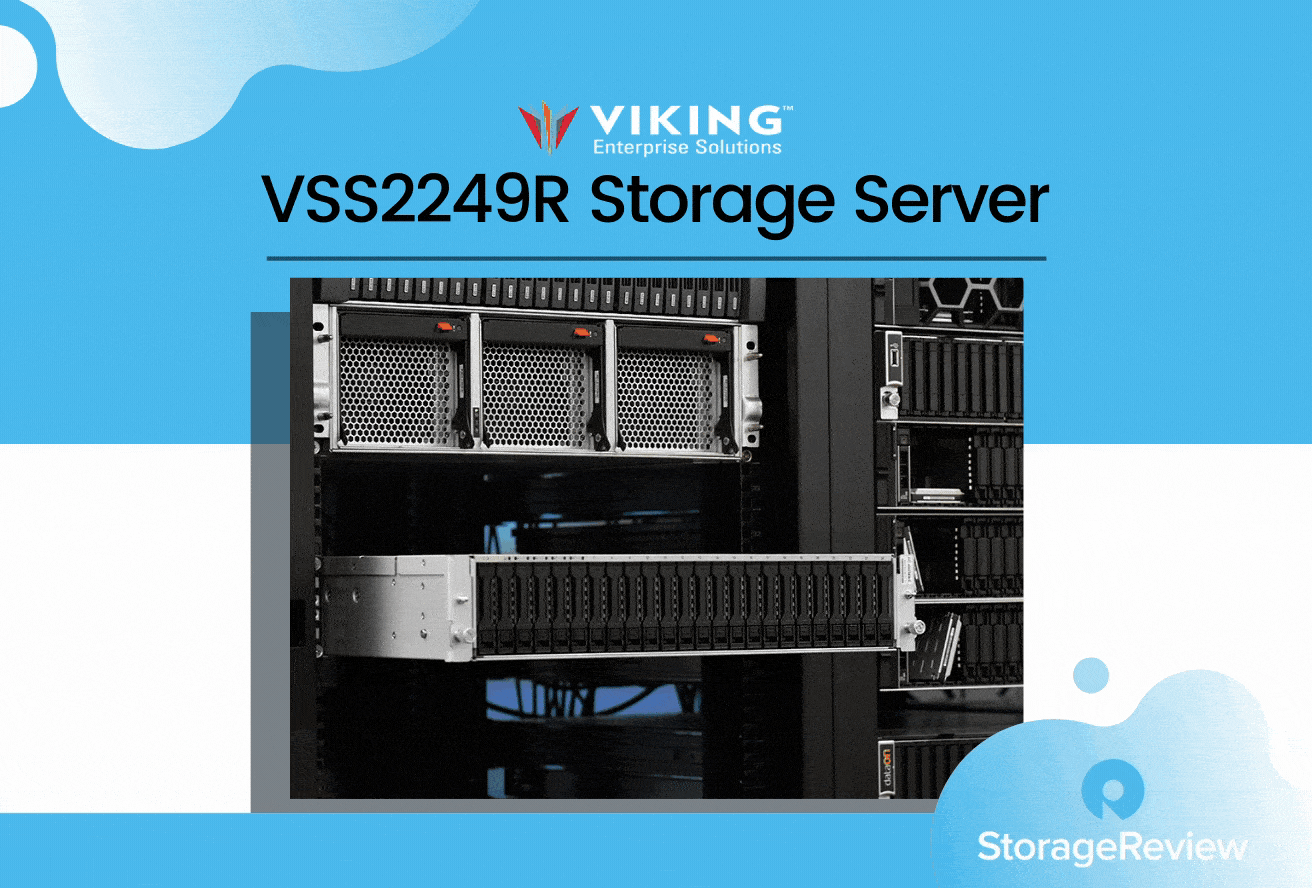Viking Enterprise Solutions (VES) is a leading storage and server development company that specializes in developing systems for enterprise OEM customers, providing large-scale solutions for high performance and cloud computing. With such a diverse customer base, VES is a dynamic company and ready to take advantage of emerging technologies to help its customers maintain a competitive advantage.
Viking Enterprise Solutions (VES) is a leading storage and server development company that specializes in developing systems for enterprise OEM customers, providing large-scale solutions for high performance and cloud computing. With such a diverse customer base, VES is a dynamic company and ready to take advantage of emerging technologies to help its customers maintain a competitive advantage.
VES is headquartered in San Jose, CA and is a product division of the Sanmina Corporation, which is one of the world’s largest manufacturers of complex electronic products in industries, such as computing and storage, medical, defense and aerospace, semiconductor, automotive, and clean technology. VES has been a member of the Sanmina® family since 2002 and was originally known as Newisys, Inc. until 2018 when they changed their name to Viking Enterprise Solutions.
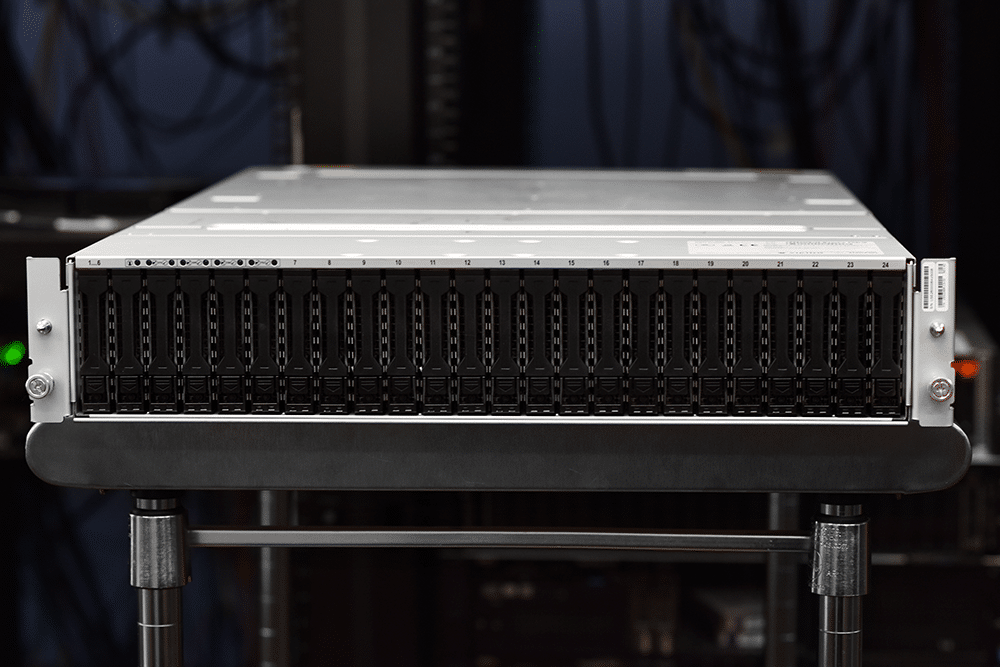
Keeping customers ahead of the curve is exactly what VES has done with the recent platform release of the VSS2249R Storage Server: a dense 2U form factor with 24 dual-ported drive bays that utilize PCIe Gen4 and NVMe technologies.
Each of the two VSSEP1EA compute nodes are driven by one AMD EPYC (Rome) CPU (up to 64-core, 225W) and support dual x16 PCIe Gen4 add-in cards, one OCP NIC 3.0 x16 PCIe Gen4 add-in card, and up to 8 DIMMs providing a maximum of 1TB of DDR4 memory. With ample storage I/O and bandwidth potential, the platform is ideal for use cases such as edge-computing storage, analytics, machine learning, AI, OLTP transactional databases, high-frequency trading, modeling, simulation, and scientific research.
The VSS2249R design allows both compute nodes to simultaneously communicate with all SSDs, enabling higher availability and increased performance. Access from the compute nodes to the SSDs can be handled in a variety of ways that provide customers with added flexibility. Cluster-aware software solutions, multiple partitions, as well as multiple namespaces can allow each node to access the same SSD at the same time, without overlapping writes.
The VSS2249R’s support for PCIe Gen4 NVMe SSDs is material, as this new interface brings massive gains in sequential and random performance, as well as lower latency when compared to the previous generation. For example, some of the Gen4 enterprise drives we reviewed are quoted to deliver roughly 7GB/s read and in excess of one million IOPS, which is a massive gain on PCIe Gen3.
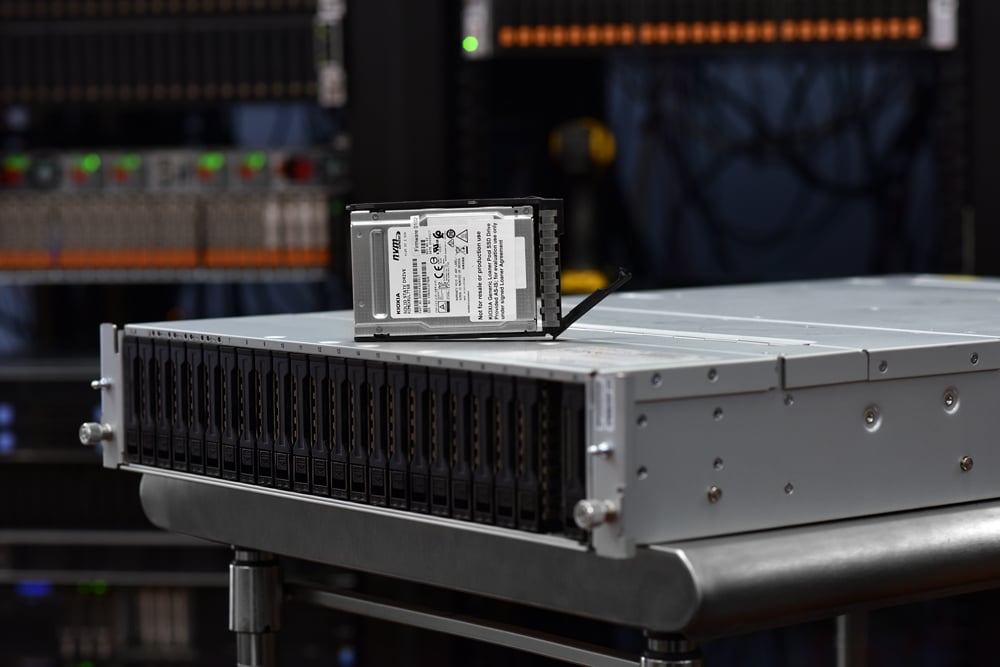
We outfitted the VSS2249R Storage Server with 24 KIOXIA CM6 7.68TB PCIe Gen4 NVMe SSDs. The CM6 comes with quoted speeds of up to 6.9GB/s and over 1.4 million IOPs at 25W of maximum power consumption. The drive also features BiCS FLASH TLC NAND, MTTF of 2,500,000 hours, and a 5-year warranty. The CM6 is also dual-ported to provide high availability. These drives leverage the U.3 form factor (SFF-TA-1001 conformant), allowing users to operate them in tri-mode enabled backplanes.
Though we are using the 7.68TB model, the CM6 comes in capacities ranging from 800GB to a massive 30.72TB, enabling them to be the storage backbone of highly adaptable and scalable servers. These drives come in both read-intensive (CM6-R) and mixed-use (CM6-V) models, and there is also a range of secure versions such as a Sanitize Instant Erase (SIE), a Self-Encrypting Drive (SED), and a FIPS 140-2 (Level 2) model.
Our specific model used in the VSS2249R Storage Server is the KCM6XRUL7T68, the write-intensive version of the line. In terms of performance, this drive has the potential to boast some pretty impressive numbers on paper. KIOXIA states that their drive delivers up to 6,900MB/s and 4,000MB/s in sequential reads and writes, respectively, while random 4K performance is expected to reach up to 1.4M IOPS read and 170K IOPS write.
Viking Enterprise Solutions VSS2249R Design and Build
The VSS2249R Storage Server is a 2U form factor, supporting up to 24 2.5-inch U.2 (SFF-8639) NVMe SSDs via the PCIe Gen4 interface. At just under 40 inches in enclosure length (with the CMA installed), it is designed to fit in 1-meter racks, while the rail kits support 27-inch and 37-inch rail depths.
VES has gone to great lengths to ensure efficient and direct access from the SSDs to the AMD CPUs. All drives and rear AIC/OCP slots are directly connected to the CPU. This design required joint engineering time with AMD and is the most efficient implementation without the use of PCI switches or retimers. The net result allows each server to offer the lowest latency and highest bandwidth solution.
The VSS2249R Storage Server was designed so that its dual hot-swappable VSSEP1EA Server Modules are serviceable at the rear panel. This flexible configuration build and ease of use allow it to be deployed in a range of different applications. Removing a server module is a seamless process. We simply had to loosen the thumbscrews (located on the right side of each module at the back panel) and pull the lock bar downward, which allowed us to pull the module out of the enclosure.
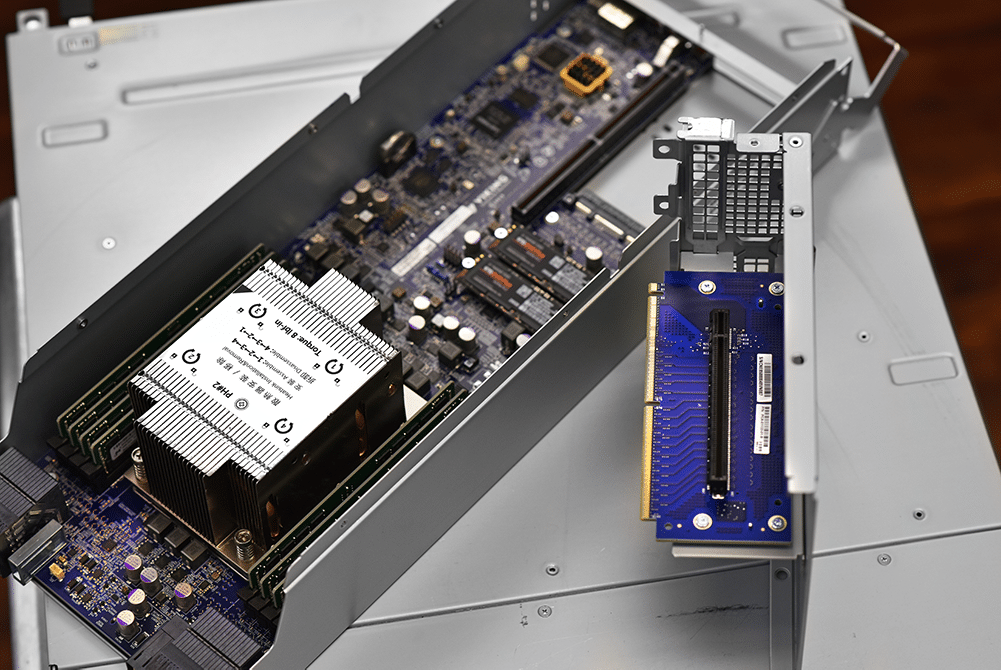 On the back panel, each module features a range of connectivity, including a USB Mini-B console port, a 1GbE RJ45 port (to access the BMC WebUI), two PCIe Gen4 add-in card slots (for further expansion and flexibility), an OCP 3.0 Mezzanine card slot, a USB 3.1 Gen1 type A port, and a BMC PCIe video port.
On the back panel, each module features a range of connectivity, including a USB Mini-B console port, a 1GbE RJ45 port (to access the BMC WebUI), two PCIe Gen4 add-in card slots (for further expansion and flexibility), an OCP 3.0 Mezzanine card slot, a USB 3.1 Gen1 type A port, and a BMC PCIe video port.
Each module is powered by a single AMD EPYC Rome and eight DDR4 3200 MHz memory channels with one DIMM per channel (DPC). The server module also has support for future NVDIMMs.
In addition, each node features an N+1 redundant power module (PM), which is available in a range of different capacities (standard with 1600W, but support for 2200W depending on configuration) to support higher wattage PCIe cards and SSDs. Replacing a power module is easy: Push down on the release tab (located at the top left of the PM) while pulling the finger handle toward you.
For cooling, the VSS2249R is equipped with six 60mm single impeller fans (five plus one redundant). These fans are hot-swappable and top loadable, which makes popping them out and back in quick and easy, so users will have no trouble replacing a fan if one fails.
The VSS2249R Storage Server uses the ASPEED AST2500 iBMC, the company’s 6th generation server management processor. The AST2500 iBMC enables users to connect the host PC to the server’s serial or video functionality in order to modify BIOS settings and install an operating system. VES also supports Redfish, which is a RESTful API that offers a modern management methodology.
Viking Enterprise Solutions VSS2249R Testing/Performance
Hardware configuration:
- 24 x KIOXIA KCM6XRUL7T68 7.68TB CM6
- 2 x AMD 7742 CPUs (single processor nodes)
- 512GB RAM (256GB per node)
- CentOS 7 (3.10.0-1062.el7.x86_64)
To measure the performance of the 24 KIOXIA CM6 PCIe Gen4 NVMe SSDs, we configured each SSD with two namespaces, splitting the drives in half. Each namespace was then pre-filled to capacity before being partitioned to 25% of its size so that our tests worked within 25% of the total drive’s capacity for a working dataset size of 46TB.
We then used FIO as our workload generator to perform “four corners” testing to look at peak throughput and bandwidth, in addition to common mixed workload profiles.
While performance is expected to be good on any all-flash platform, the VSS2249R Storage Server takes it to a whole new level. Peak throughput in our 4K random read and random write workloads were the highest numbers we’ve ever recorded for a 2U system. Read performance measured in at 23.5M IOPS, working out to about 11.7M IOPS per node, or 980K IOPS per SSD. Write performance was equally as impressive, measuring 16.63M IOPS, or 690K IOPS per SSD.
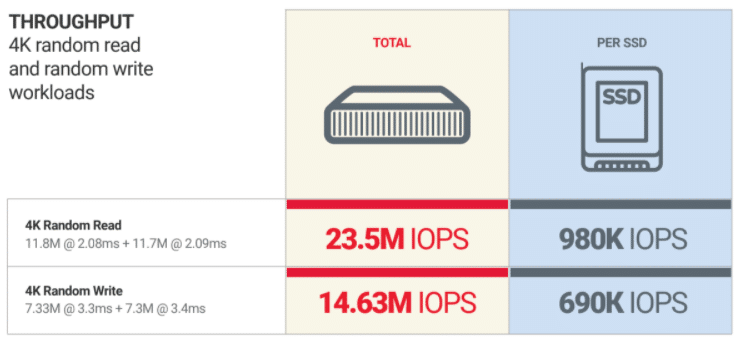
While high throughput is great for high-speed transactional workloads, high bandwidth is equally as important for areas that need to ingest data quickly. The VSS2249R didn’t disappoint in this area either. We recorded an astounding 125.3GB/s read in our 64K sequential workload or 5.22GB/s per SSD. Sequential write bandwidth came in at 63.2GB/s or 2.63GB/s per SSD. There isn’t much that comes close to these figures in the market today.
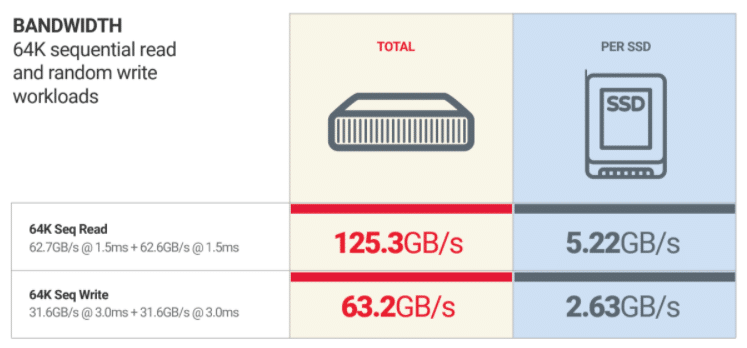
From a mixed workload perspective, the VSS2249R carried on with the trend of exceeding our expectations. In our 4K 70/30 workload, we measured an aggregate performance level of 7.64M IOPS. In a larger 8K 70/30 workload size, we measured 3.82M IOPS or 159.2K IOPS per SSD. Lastly in our SQL profile with a 97/3 R/W spread, the platform topped out at 11.85M IOPS, or just under 500K IOPS per SSD.
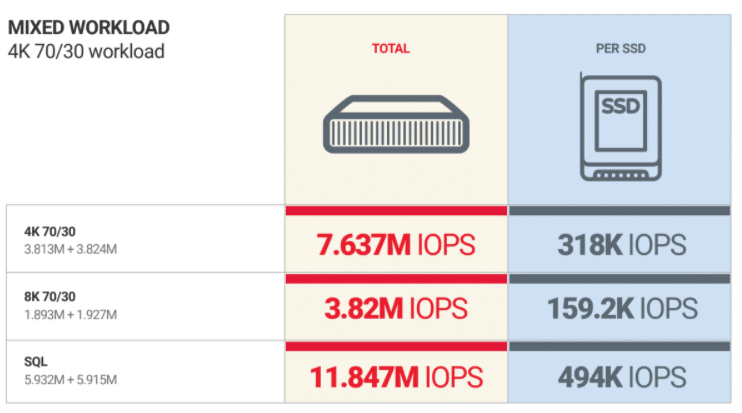
Concluding Thoughts
The Viking VSS2249R Storage Server is an impressively dynamic server, to say the least. It features a dense 2U form factor server with 24 dual-ported PCIe Gen4 NVMe bays spread across the front. As the results of our benchmarks prove, it will excel in use cases like edge computing storage, analytics, machine learning, AI, OLTP transactional databases, high-frequency trading, modeling, simulation, and scientific research. All of this is possible due to its powerful two-compute node build, each of which is powered by AMD EPYC (Rome) CPUs that support two x16 PCIe Gen4 slots, one OCP NIC 3.0 PCIe Gen4 add-in cards, and up to 8 DIMMs of DDR4 memory.
Our build was configured with 24x KIOXIA 7.68TB CM6 drives, two AMD 7742 CPUs (single processor nodes), and 512GB RAM (256GB per node) during our extensive set of benchmarks. Unsurprisingly, the outcome showed bar-setting I/O and bandwidth with some of the best numbers we’ve ever seen by far. Needless to say, it exceeded all expectations.
In random 4K performance, the VES server showed a whopping 23.5M IOPS, which translates to roughly 11.7M IOPS per node, or 980K IOPS per SSD. Write performance was just as impressive with its 16.63M IOPS, or 690K IOPS per SSD. For our 64K sequential tests, the VSS2249R continued this unprecedented performance with 125.3GB/s read (or 5.22GB/s per SSD) and 63.2GB/s write (or 2.63GB/s per SSD). These were easily the best numbers we’ve seen for any 2U system; nothing really comes close.
Moving on to a mixed workload environment for our tests, the VSS2249R continued to have bar-crushing numbers. In our 4K 70/30 workload, the VES server showed an aggregate performance level of 7.64M IOPS, while the larger 8K 70/30 workload size measured 3.82M IOPS (or 159.2K IOPS per SSD). Lastly, the SQL profile, which uses a 97/3 R/W spread, topped out at 11.85M IOPS, or just under 500K IOPS per SSD.
In total, it’s clear that Viking Enterprise Solutions is an engineering first organization. We can see this DNA in the physical build of the system, ranging from the well-executed midplane to the easily accessible field replaceable parts. Further, the cooling layout is superb, which is critical to driving performance. On that note, the VSS2249R Storage Server excels, cranking out over 125GB/s in a 2U box. The build and performance profile affords the VSS2249R a lot of flexibility in terms of workloads. Any performance-hungry application would be thrilled to run on this box. It’s absolutely fantastic.
This report is sponsored by Viking Enterprise Solutions. All views and opinions expressed in this report are based on our unbiased view of the product(s) under consideration.

